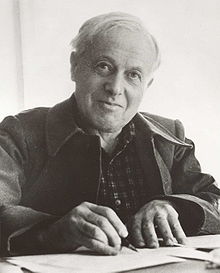Soziologie
 Eugen Rosenstock-Huessy (1888-1973), German social philosopher. Photo courtesy of Marriot Huessy, Eugen Rosenstock-Huessy Fund | |
| Author | Eugen Rosenstock-Huessy |
|---|---|
| Language | German |
| Subject | Social philosophy |
| Genre | Philosophy |
| Publisher | W. Kohlhammer Verlag |
Publication date | 1956-1958 |
| Publication place | Germany |
| Pages | In 3 volumes, hardbound, about 1050 pages |
| ISBN | 3-89376-065-2 |
Soziologie is book byEugen Rosenstock-Huessy (1888-1973), German social philosopher, addressing the spatial and temporal influences on “human life, language and associations. To Rosenstock-Huessy, speech is central to sociology; sociology must recognize that speech is the concrete form of social reality.”[1] Although it is Rosenstock-Huessy’s most systematic work. his two volume Soziologie, has never been translated into English. It is a work that he revised periodically throughout his adult life. The book has three volumes, Die Übermacht der Räume (Obsession with Spaces), Die Vollzahl der Zeiten, Bd. I&II , and The Full Count of Times 2 (The Full Count of Times), volumes 1 and 2.[2]
Overview
In Volume 1,[3] Rosenstock-Huessy addresses the areas of existence in which people confront serious life, such as marriage or service in war. “He says that important human experiences like these are created by human powers like enthusiasm, love, or faith. He then contrasts these life-changing, deeply rooted experiences in time and space with the abstract concepts, space and time. He sees these human powers as the concrete forces which create timespans, and so create and structure history.”[4] In Volume 2, [5] he treats history as one part of each person’s soul and thereby a major influence individuals’ actions. Recurring historical events and times constitute both people’s personal experiences and parts of the whole. In Volume 3, he addresses people living together and how they create communities and social structures.[6]
References
- ^ Soziologie, 2007, retrieved November 16, 2007
- ^ Soziologie, 2007, retrieved November 16, 2007
- ^ Rosenstock, Eugen (1956), Soziologie, Bd. 1, Die Übermacht der Räume, Stuttgart, Berlin, Köln, Mainz: W. Kohlhammer Verlag
- ^ Soziologie, 2007, retrieved November 16, 2007
- ^
Rosenstock, Eugen (1958), Soziologie, Bd. 2, Die Vollzahl der Zeiten, Stuttgart: W. Kohlhammer Verlag,
{{citation}}: CS1 maint: extra punctuation (link) - ^ Soziologie, 2007, retrieved November 16, 2007
External links
- The official web site of the Eugen Rosenstock-Huessy Fund and Argo Books includes a biography, accessed 20 March 2007
- The Norwich Center, Norwich, Vermont, maintains an internet site devoted to an introductory biography and appreciation of Eugen Rosenstock-Huessy, signed by Clinton C. Gardner, President of the Norwich Center, accessed 20 March 2007
- Eugen Rosenstock-Huessy Gesellschaft
